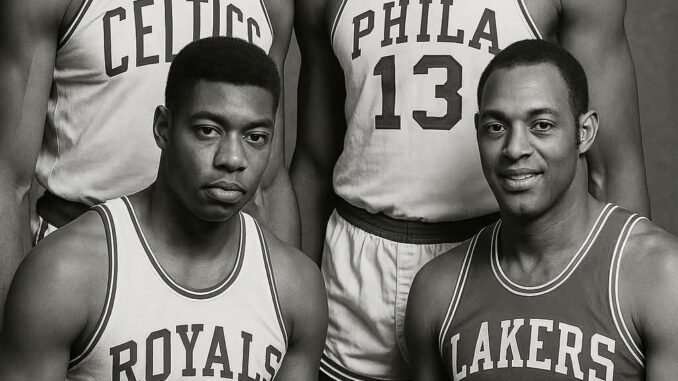
Russell, Wilt, Oscar, and Baylor: When Legends Collided in the Greatest Individual Season Ever
The debate over NBA eras is never-ending. From LeBron vs. Jordan to discussions about pace, athleticism, and competition, fans often dismiss earlier decades as outdated or inferior. But for anyone who thinks the past was soft or unimpressive, one glance at the 1962 NBA MVP race should be enough to stop that narrative cold.
That single season saw four Hall of Famers—Bill Russell, Wilt Chamberlain, Oscar Robertson, and Elgin Baylor—post numbers that defy belief even today. It wasn’t just dominant; it was mythical. The league had never seen that level of individual brilliance all at once—and arguably never has since.
The 1962 MVP Voting Results:
1. Bill Russell – Boston Celtics
- 18.9 points per game
- 23.6 rebounds per game
- 45.2 minutes per game
- MVP Winner
Russell didn’t win because of flashy stats—he won because he was the ultimate winner. The Celtics went 60-20, dominating the league. His leadership, defense, and rebounding defined the dynasty. Even in an era where everyone seemed to be putting up jaw-dropping numbers, Russell’s impact couldn’t be measured just in points—it was about championships, culture, and control of the paint.
2. Wilt Chamberlain – Philadelphia Warriors
- 50.4 points per game
- 25.7 rebounds per game
- 48.5 minutes per game
Yes, you read that right. 50.4 PPG. Over a full season. Wilt Chamberlain played every single minute of regulation (and even some overtimes), leading the league in points and rebounds by massive margins. He scored 100 in a game that year and had 45 games of 50+ points. The fact that this was somehow not enough to win MVP speaks more to the strength of the competition than any slight against Wilt. His 1962 season is still the most statistically dominant year in basketball history.
3. Oscar Robertson – Cincinnati Royals
- 30.8 points per game
- 12.5 rebounds per game
- 11.4 assists per game
Oscar’s 1962 season is the stuff of legend. He became the first player to average a triple-double for an entire season—something that wouldn’t be replicated until decades later by Russell Westbrook. But Oscar did it in an era without pace-and-space or generous assist recording. He was a complete basketball machine, blending power, precision, and poise. He essentially redefined what a guard could do.
4. Elgin Baylor – Los Angeles Lakers
- 38.3 points per game
- 18.6 rebounds per game
- 44.4 minutes per game
What’s more mind-blowing than Baylor’s stats? The fact that he did it while still serving in the military. That’s right—Elgin Baylor was on active duty with the U.S. Army and could only play on weekends and leaves. Despite the limited schedule, he still put up one of the greatest scoring seasons ever. Baylor was athleticism and elegance personified—an aerial artist before the world ever heard of Michael Jordan.
Why 1962 Stands Alone
The numbers are one thing. But context makes 1962 even more special.
- Minutes Played: All four stars averaged over 44 minutes per game—meaning they rarely left the floor. No load management. No nights off. They were warriors in every sense.
- Depth of Talent: The league only had 9 teams, meaning the level of nightly competition was fierce. Every night, these legends were facing off against each other.
- Impact: Each player fundamentally shifted the game. Russell redefined defense and winning. Wilt was a statistical alien. Oscar invented the all-around guard. Baylor brought showtime athleticism before it had a name.
So Who Deserved MVP?
It’s one of the most hotly debated MVP races in history. On sheer numbers, Wilt seems untouchable. But MVP is about value, and Bill Russell’s Celtics had the best record in the league, largely due to his defense and intangibles. He was the anchor of a team-first juggernaut.
Oscar Robertson’s triple-double season was groundbreaking, but the Royals didn’t have the team success that voters craved. Baylor was dazzling, heroic even—but his part-time status due to military service may have held him back in the eyes of voters.
Ultimately, Russell’s MVP win was a testament to how greatness can’t always be measured by stats alone. His influence was woven into every Celtics win.
Legacy of the 1962 MVP Race
No other MVP race has ever stacked up like 1962. While modern seasons have incredible individual performances—like Westbrook’s triple-doubles, Jokic’s wizardry, or Curry’s shooting sprees—no single year has combined scoring dominance, team success, all-around brilliance, and pure mythology quite like this one.
It was a clash of titans—four players with very different styles, all playing at their peaks, all changing basketball forever.
Final Thoughts: A Golden Era Too Often Ignored
The next time someone tells you that “those guys wouldn’t survive in today’s game,” show them the numbers from 1962. Show them the minutes played. Show them the stat lines. Show them the greatest MVP race of all time.
Because these weren’t just good players in a primitive era. These were pioneers, legends, and architects of the modern game.
Russell, Wilt, Oscar, and Baylor—not just MVP candidates, but cornerstones of basketball greatness.
And in 1962, they gave us a season for the ages.
Leave a Reply